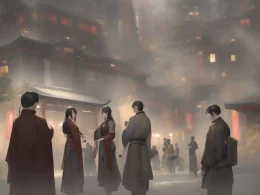Idiom Explanation:
A waterway is naturally formed where water flows. The metaphor is that when the conditions are ripe, things will naturally succeed.
Pronunciation:
水到渠成
shuǐ dào qú chéng
Origin:
宋·苏轼《答秦太虚书》:“至时别作经画,水到渠成,不须预虑。”
Story:
During the Northern Song Dynasty in China, there was a man named Su Shi (蘇轼), who was known as Zizhan (子瞻) and Dongpo Jushi (東坡居士). His father, Su Xun, and his younger brother, Su Zhe, were both famous ancient writers at that time, and were known as the "Three Su". Su Shi received a good family education in his early childhood and studied hard himself, so he had a broad knowledge of history and culture and showed his artistic talents in many aspects in his youth. When he took the entrance examination in 1057 A.D., Ouyang Xiu, seeing his essays, even said, "Excellent! Fast!" In that year, at the age of twenty-one, Su Shi was a high school scholar.
Su Shi was no exception to the rule that "since ancient times, there have been many trials and tribulations for the masters". When Wang Anshi was presiding over the law change, Su Shi stood on the opposite side and made several speeches to Emperor Shenzong, stating strongly the various disadvantages of the new law. Su Shi's remarks naturally aroused Wang Anshi's discontent, and Wang Anshi, through his cronies, collected incriminating charges and wrote a letter to impeach Su Shi. Feeling that he was struggling in the capital, Su Shi requested to be a foreign official. In April 1079, Su Shi arrived at Huzhou, and soon after his arrival, a disaster fell from the sky. In July of the same year, the imperial court (formerly called Wutai) sent people to arrest Su Shi and escort him to Bianjing (present-day Kaifeng, Henan Province) on the charge of slandering the court by writing poems. Su Shi was imprisoned for more than one hundred days, and was tried more than ten times and tortured. He was later released in December of that year after being rescued by various parties and relegated to the position of deputy envoy of Huangzhou (now Huanggang, Hubei Province). This is the famous Wutai poetry case of the Song Dynasty.
During the period when Su Shi was relegated to Huangzhou, he not only felt very lonely mentally, but also was poor and strapped for cash in life. At that time, the salary given to him by the court had been used up, and the Su family had a large population, so he had to find ways to save money. On the first day of each month, he would take out 4,500 coins, divide them into 30 portions, put them in small bags and hang them on the beams of the house. Every morning, he used a long fork, which he usually used to take paintings and hang paintings, to pick down a bag from the beam, and then he collected the long fork. The money that could not be used up that day was collected separately in a large bamboo tube and used to entertain guests. When a lot of money was saved in the big bag, then other arrangements were made. In this way, Su Shi and his family spent the most miserable four years of his life.
When Su Shi wrote a letter to his friend Qin Guan, he said, "Live your life normally, save little by little, and then make arrangements when you accumulate more, it will naturally come to fruition, there is no need to make pre-planning." At such a bad time, Su Shi was still able to be calm and composed, which is really very human. This is exactly: only the great hero can be the original color, is the real famous man since the wind flow.
Similar Idioms:
- 顺理成章
- 瓜熟蒂落












